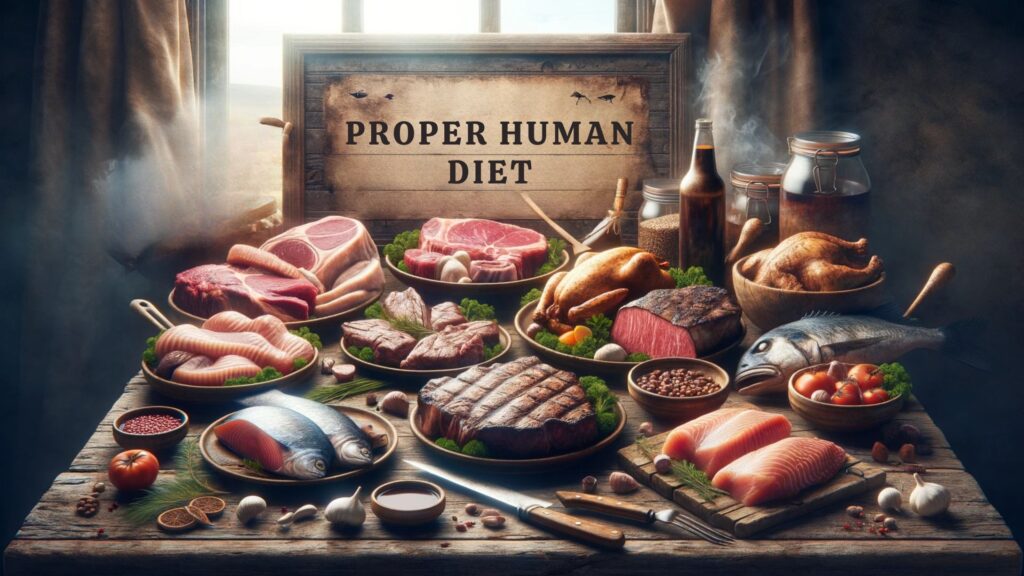Discover 7 Ways the Carnivore Diet Works, showing its role in the proper human diet spectrum, from enhancing weight loss and hormonal balance to reducing cravings and inflammation.
Introduction
The Carnivore Diet, a regimen focusing on animal proteins and fats, has gained significant attention for its health benefits. In this article, I shed light on the mechanisms behind its success. I will delve into the seven key ways the Carnivore Diet can transform your health. Please note that the insights presented in this article are interpretations of Dr. Ken Berry’s thoughts on the Carnivore Diet, as understood and conveyed by me. They reflect a synthesis of his expertise and perspectives on this dietary approach.
Satiety and Hunger Control

Feeling Full Longer with Proteins and Fats
A standout advantage of the Carnivore Diet is its remarkable capacity to promote a feeling of fullness for extended periods, making it a powerful tool for managing hunger and controlling eating patterns. This aspect is pivotal for those aiming to maintain a healthy weight or combat food addiction.
The Role of Protein and Fats in Satiety
Proteins and fats, the primary components of the Carnivore Diet, play a critical role in regulating satiety. These macronutrients have a slower digestion rate compared to carbohydrates, leading to prolonged feelings of fullness. Proteins, in particular, are known for their satiating effect, which can curb the desire to eat frequently.
Hormonal Impact
The diet’s influence on hunger-controlling hormones is a vital component of its effectiveness. Proteins and fats significantly impact hormones like leptin and ghrelin, which regulate hunger and fullness cues. Leptin, often referred to as the “satiety hormone,” signals to the brain that the body has enough energy, reducing the urge to eat. On the other hand, ghrelin, known as the “hunger hormone,” increases appetite. A diet rich in proteins and fats, like the Carnivore Diet, can balance these hormones, leading to reduced hunger pangs and a lower tendency to snack impulsively.
Reduced Snacking and Meal Frequency
By balancing these hunger hormones, individuals following the Carnivore Diet often find themselves naturally reducing their eating frequency. This decrease in the need to snack between meals or the urge to consume large portions can be a game-changer for weight management. When the body is nourished adequately with nutrient-dense foods, the need to eat out of boredom, stress, or habit diminishes.
Aiding in Food Addiction Control
For many grappling with food addiction or compulsive eating behaviors, the Carnivore Diet offers a potential solution. The satiating nature of the diet helps to break the cycle of constant eating, providing a pathway to healthier eating habits. By focusing on high-quality proteins and fats and eliminating addictive processed carbohydrates and sugars, the diet can help reset the body’s natural hunger cues, leading to a more mindful and controlled approach to eating.
Weight Management Implications
The ability to stay fuller for longer also has significant implications for weight management. With reduced cravings and a natural inclination towards eating less frequently, individuals on the Carnivore Diet may find it easier to maintain a caloric deficit, which is essential for weight loss. Additionally, the high nutrient density of meats and animal products can support metabolic health, muscle maintenance, and overall well-being, contributing to a healthier body composition.
Conclusion
In summary, the Carnivore Diet’s focus on proteins and fats offers a compelling approach to controlling hunger and promoting satiety. By positively influencing hunger hormones and reducing the need for frequent eating, this diet can be an effective strategy for managing food addiction and supporting weight management goals. As with any dietary change, it’s important to consider individual health needs and consult with a healthcare professional for personalized advice.
Blood Sugar Regulation

Stabilizing Blood Sugar Levels
The Carnivore Diet’s potential to regulate blood sugar levels stands out as one of its most significant health benefits, particularly for individuals with diabetes, pre-diabetes, or those seeking to improve their overall metabolic health.
Low Carbohydrate Intake
At the heart of the Carnivore Diet’s ability to stabilize blood sugar is its inherently low carbohydrate content. Unlike diets that include significant amounts of carbohydrates, the Carnivore Diet primarily consists of proteins and fats, which have minimal impact on blood sugar levels. This is crucial because carbohydrates are broken down into sugars in the body, leading to increases in blood glucose levels.
Reduced Blood Sugar Spikes
By focusing on a diet rich in protein and fat, the likelihood of experiencing the rapid blood sugar spikes often associated with carbohydrate consumption is greatly diminished. This stability is particularly beneficial for people with diabetes, as it aids in maintaining blood sugar levels within a healthy range, reducing the risk of complications associated with high blood sugar.
Benefits of Diabetes Management
For individuals with diabetes, particularly Type 1 and Type 2, managing blood sugar is a critical aspect of their overall health. A diet low in carbohydrates, like the Carnivore Diet, can be an effective tool in achieving better blood glucose control. It simplifies dietary choices and reduces the need for frequent adjustments in medication, especially insulin, that are often required in response to carbohydrate intake.
Impact on Insulin Sensitivity
Consistently high levels of blood sugar can lead to insulin resistance, a condition where the body’s cells become less responsive to insulin. The Carnivore Diet’s role in maintaining stable blood sugar levels can help improve insulin sensitivity. This is because when blood sugar levels are stable, the body requires less insulin to manage glucose, reducing the strain on the pancreas and enhancing overall metabolic health.
Pre-diabetes and Metabolic Syndrome
Individuals with pre-diabetes or metabolic syndrome stand to benefit significantly from the blood sugar-stabilizing effects of the Carnivore Diet. By preventing the typical blood sugar spikes and drops associated with carbohydrate-rich meals, the diet can play a pivotal role in preventing the progression of Type 2 diabetes and in improving markers of metabolic health.
Conclusion
In summary, the Carnivore Diet offers an effective approach to regulating blood sugar levels due to its low carbohydrate content. This aspect of the diet is particularly advantageous for people with diabetes, pre-diabetes, and those seeking to improve their insulin sensitivity and overall metabolic health. As with any significant dietary adjustment, it’s important to consult with a healthcare professional to ensure it aligns with individual health needs and goals.
Insulin Management

The Impact on Insulin Levels
The Carnivore Diet’s influence on insulin management is a critical aspect of its health benefits, especially in the context of reducing the risk of hyperinsulinemia and its associated health complications.
Carbohydrates and Insulin Response
Carbohydrates have a direct impact on insulin levels in the body. When we consume carbs, they are broken down into glucose, leading to an increase in blood sugar. This spike triggers the pancreas to release insulin, a hormone that helps cells absorb glucose for energy or storage. The Carnivore Diet, being low in carbohydrates, naturally minimizes these insulin spikes.
Preventing Hyperinsulinemia
Hyperinsulinemia, a condition characterized by excessively high levels of insulin in the blood, is often a result of chronic overconsumption of carbohydrates. It is linked to a host of health issues, including type 2 diabetes, obesity, heart disease, and hormonal imbalances like PCOS. By adopting a diet that is inherently low in carbs, such as the Carnivore Diet, the frequency and intensity of insulin release are significantly reduced, helping prevent or manage hyperinsulinemia.
Impact on Insulin Sensitivity
Regularly consuming high amounts of carbohydrates can lead to insulin resistance, where cells become less responsive to insulin. This can escalate into more severe health issues, including type 2 diabetes. The Carnivore Diet’s low-carb approach can aid in restoring insulin sensitivity, as the reduced demand for insulin allows the body’s cells to respond more effectively to the hormone.
Benefits Beyond Diabetes
While the impact on insulin levels is particularly beneficial for individuals with diabetes, its advantages extend to those with other conditions related to insulin resistance, such as Polycystic Ovary Syndrome (PCOS) and acne. By stabilizing insulin levels, the diet can help alleviate symptoms associated with these conditions.
Hormonal Balance and Overall Health
Stable insulin levels contribute to overall hormonal balance, which is crucial for optimal health. Fluctuating insulin levels can disrupt the balance of other hormones, leading to issues like weight gain, fatigue, and mood swings. By promoting stable insulin levels, the Carnivore Diet can play a role in maintaining a harmonious hormonal environment in the body.
Conclusion
In conclusion, the Carnivore Diet’s low-carbohydrate approach significantly impacts insulin management, offering benefits for those with hyperinsulinemia, insulin resistance, and related health conditions. Its role in stabilizing insulin levels underscores the diet’s potential to support overall metabolic health and hormonal balance. As always, it’s important to consult healthcare professionals when considering significant dietary changes, particularly for individuals with pre-existing health conditions.
Inflammation Reduction

Tackling Chronic Inflammation
The Carnivore Diet’s potential to reduce chronic inflammation marks a significant departure from common dietary beliefs. This aspect of the diet is particularly noteworthy, as inflammation is a key factor in many chronic health conditions.
Understanding Inflammation
Inflammation is the body’s natural response to injury or infection, but when it becomes chronic, it can lead to various health issues. Chronic inflammation is implicated in a range of conditions, from arthritis and inflammatory bowel disease to skin disorders and mental health challenges.
Role of the Carnivore Diet in Reducing Inflammation
The Carnivore Diet, by emphasizing a diet rich in animal proteins and fats and eliminating most carbohydrate sources, may contribute to a reduction in systemic inflammation. The diet’s exclusion of common inflammatory foods like processed carbohydrates, sugars, and certain vegetable oils, which are often linked to inflammation, plays a crucial role in this regard.
Impact on Inflammation Markers
Individuals following the Carnivore Diet have reported decreases in markers of inflammation, such as C-reactive protein (CRP), a substance produced by the liver in response to inflammation. Lower levels of CRP and other inflammatory markers suggest that the diet could be beneficial in managing conditions driven by chronic inflammation.
Benefits for Gut Health
Chronic inflammation in the gut, often manifested as conditions like Crohn’s disease, ulcerative colitis, and irritable bowel syndrome, can be particularly debilitating. The Carnivore Diet’s focus on easily digestible, nutrient-rich animal products may help reduce gut inflammation, leading to improved digestive health and symptom relief.
Joint and Skin Health
Chronic joint inflammation, as seen in conditions like rheumatoid arthritis, can significantly impact quality of life. Similarly, skin conditions like eczema and psoriasis are often exacerbated by inflammation. Adherents of the Carnivore Diet have reported improvements in joint pain and skin health, indicating the diet’s potential anti-inflammatory effects.
Mental Health Implications
Emerging research suggests a link between inflammation and mental health disorders such as depression and anxiety. By reducing systemic inflammation, the Carnivore Diet might offer ancillary benefits for mental well-being.

Conclusion
In summary, the Carnivore Diet presents a promising approach to reducing chronic inflammation, with potential benefits for gut, joint, skin, and mental health. While this diet may not be suitable for everyone, its impact on inflammation markers and related health conditions is worth considering for those struggling with chronic inflammation. Consulting with healthcare professionals is essential to ensure the diet aligns with individual health needs and goals.
Curbing Cravings
Eliminating Junk Food Cravings

A noteworthy benefit of the Carnivore Diet is its effectiveness in curbing cravings, particularly for processed and high-carbohydrate foods. This aspect of the diet is essential for those seeking to adopt healthier eating habits and move away from the lure of junk food.
Understanding Food Cravings
Food cravings are often driven by emotional, psychological, and physiological factors. They are particularly strong for processed foods high in sugars, fats, and salts, which are designed to be hyper-palatable. These cravings can be a significant obstacle to maintaining a healthy diet and lifestyle.
Impact of the Carnivore Diet on Cravings
The Carnivore Diet, with its emphasis on high-quality animal proteins and fats, offers a nutritional profile that can help diminish these cravings. When the body receives adequate nutrients from whole, unprocessed foods, it’s less likely to crave the quick energy and dopamine release that processed foods provide.
Transitioning to ‘Real Food’
As individuals adapt to the Carnivore Diet, they often experience a shift in their taste preferences and food cravings. The initial phase of the diet might involve intense cravings for familiar, carbohydrate-rich foods. However, over time, as the body adjusts to the new dietary pattern, these cravings typically subside, leading to a newfound appreciation for the natural flavors and satiety provided by meats and animal products.
Psychological and Physiological Changes
This change is not just psychological but also physiological. Consuming a diet high in protein and fats can alter the way the brain responds to food stimuli. The reduction in blood sugar spikes and insulin fluctuations also plays a crucial role, as these are often triggers for food cravings.
Benefits Beyond Weight Management
While curbing cravings is beneficial for weight management, its impact goes beyond just controlling calorie intake. Reducing the intake of processed foods can lead to improvements in overall health, including better energy levels, improved mental clarity, and a decrease in symptoms associated with food-related disorders.
Conclusion
In conclusion, the Carnivore Diet’s ability to curb cravings for junk and processed foods is a significant advantage for those looking to improve their dietary habits. By focusing on nutrient-rich animal foods, the diet helps to realign the body’s natural hunger cues and reduces the temptation of unhealthy food choices. As with any dietary change, it’s essential to consult with a healthcare provider to ensure it’s a suitable approach for your individual health needs.
Weight Loss

Losing Weight on a High-Fat Diet
The Carnivore Diet presents a paradigm shift in weight loss strategies, challenging the long-held belief that high fat intake leads to weight gain. Instead, it underscores the role of carbohydrates in obesity and illustrates how a high-fat, low-carb diet can be effective for weight loss.
Debunking the Fat-Weight Gain Myth
The common misconception that eating fat results in gaining fat has been a cornerstone of many dietary guidelines. However, recent insights, like those from Dr. Berry, suggest that the relationship between dietary fat and body fat is not so straightforward. In fact, dietary fat can be satiating, leading to less overall calorie consumption.
Role of Carbohydrates in Weight Gain
Carbohydrates, especially refined ones, can cause blood sugar and insulin spikes, leading to fat storage in the body. High carbohydrate intake, particularly from processed foods, is increasingly recognized as a significant contributor to obesity. The Carnivore Diet’s low-carb approach helps mitigate this issue by stabilizing blood sugar and insulin levels.
How the Carnivore Diet Facilitates Weight Loss
The diet aids in weight loss through several mechanisms:
- Satiety: High protein and fat intake leads to a feeling of fullness, reducing overall calorie consumption.
- Insulin Regulation: Lowering carbohydrate intake helps regulate insulin levels, making it easier for the body to access and burn stored fat.
- Metabolic Efficiency: The body becomes more efficient in burning fat for fuel, a process known as ketosis, which can contribute to weight loss.
Nutrient Density and Muscle Maintenance
The nutrient density of the foods in the Carnivore Diet also plays a role in weight loss. High-quality proteins and fats provide essential nutrients, supporting muscle maintenance and overall metabolic health, crucial factors in sustainable weight loss.
Long-Term Sustainability
While initial weight loss on the Carnivore Diet can be significant, its long-term sustainability is an important consideration. The diet’s restrictive nature may make it challenging for some to adhere to indefinitely. However, it can be a valuable kickstart to a weight loss journey or a reset for those struggling with carbohydrate-driven cravings and weight gain.
Conclusion
In conclusion, the Carnivore Diet offers an alternative perspective on weight loss, focusing on reducing carbohydrate intake rather than fearing dietary fats. By understanding the role of different macronutrients in the body, individuals can make more informed choices about their eating habits. As with any significant dietary change, consulting with healthcare professionals to tailor the approach to individual health needs is vital.
Hormonal Balance and Protein Sufficiency

Optimizing Hormones and Protein Intake
The Carnivore Diet not only focuses on what you eat but also addresses the essential aspects of hormonal balance and protein sufficiency. This approach has far-reaching implications for overall health, including muscle building, bone strength, and cellular repair.
Hormonal Balance Through Diet
Hormones like testosterone play a crucial role in various bodily functions, from mood regulation to muscle growth. The Carnivore Diet, rich in nutrients essential for hormone production, supports the natural balance of these hormones. By providing a high intake of quality fats, which are precursors for hormone synthesis, the diet can positively influence hormonal health.
Testosterone and Other Hormones
For men, an adequate level of testosterone is vital for physical strength, energy, and overall well-being. The diet’s emphasis on protein and fat can help optimize testosterone levels. Women also benefit hormonally, as the diet aids in balancing estrogen and progesterone levels, which can be particularly beneficial for conditions like PCOS.
Bioavailable Protein Intake
Proteins are the building blocks of the body, and their adequacy is critical for muscle building, bone strengthening, and repairing tissues. Animal proteins, which are a staple of the Carnivore Diet, are highly bioavailable, meaning they are easily absorbed and utilized by the body. This high bioavailability ensures that the body gets the necessary amino acids for its various functions.
Muscle Building and Repair
For those engaged in physical activity or looking to increase muscle mass, the Carnivore Diet provides ample protein to support muscle growth and repair. The amino acids found in animal proteins are essential for muscle synthesis and recovery after exercise.
Bone Health
Protein intake is also closely linked to bone health. The amino acids from protein help maintain bone density and strength. The diet’s focus on nutrient-rich animal foods provides both protein and other nutrients like calcium and vitamin D, which are crucial for healthy bones.
Enhanced Cellular Repair
Adequate protein intake is essential for the body’s ability to repair and regenerate cells. This includes not just muscle cells but also skin, hair, and internal organs. By ensuring sufficient protein consumption, the Carnivore Diet supports the body’s natural regenerative processes.
Conclusion
In summary, the Carnivore Diet offers a comprehensive approach to health by promoting hormonal balance and ensuring adequate protein intake. These factors are crucial for muscle and bone health, as well as overall physiological well-being. As with any dietary plan, individual needs and health conditions should be considered, and consulting with a healthcare provider is recommended to ensure the diet is appropriate and beneficial.
A Spectrum of the Proper Human Diet

The Carnivore Diet is more than a dietary fad; it’s a return to the ancestral way of eating that can lead to significant health improvements. With benefits ranging from weight loss to reduced inflammation, the Carnivore Diet holds the promise of a healthier, more balanced life. The carnivore diet is on the proper human diet spectrum.
Remember, it’s always advisable to consult with a healthcare professional before starting any new diet, especially one as specific as the Carnivore Diet.
For a deeper understanding of the principles behind the Carnivore Diet and its place within the broader context of nutritional health, explore our comprehensive Beginner’s Guide to the Proper Human Diet, where we delve into the fundamentals of optimal eating habits for long-term well-being.


